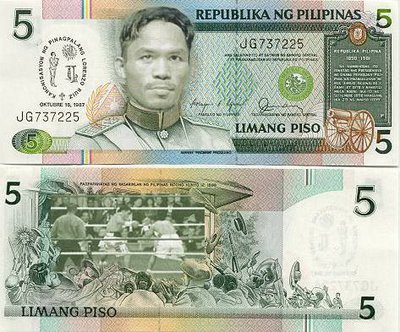Wednesday, July 19, 2006
WE HAVE A LOT TO LEARN FROM THE INDONESIAN ELECTIONS - 06.18.1999
UPON invitation of Indonesian President B.J. Habibie, the Philippine government sent a 108-member delegation composed of National Movement for Free Election (NAMFREL) voluteers, headed by mission chief Chairman Jose Concepcion and deputy chief of mission Gen. Thelmo Cunanan, to observe the general elections held on June 7, 1999.
This writer was lucky to be among the volunteers sent to cover the first ever free electoral exercise of the Indonesians after 44 years since their last democratic elections were conducted.
At our arrival on June 3, while enroute to our hotel from the Sukarno-Hatta International airport in Jakarta, we already witnessed the throng of red-clad rallyists almost from all ages swarming the city streets. Eventually, we learned that it was the designated day for the PDI-Perjuangan (the party of Megawati Sukarnoputri) to hold its party rally prior to the v-day (voting day).
We saw party loyalists dancing on the streets and chanting their party hymn with gusto, a la EDSA people power revolution, demonstrating their full support to the party cause, but with discipline.
Consequently, Golkar (the administration party) held also their rally the next day, but it was not as festive as the PDI’s. Take note that that day, Friday, was the last day of the campaign period.
The good thing about their political campaigns is that, immediately after the campaign period ended, you can see no trace of any garbage on the streets and campaign posters pasted anymore on the walls, streets and bridges because party members immediately cleaned-up before the campaign period expired - this is one lesson that we Filipinos have to learn from the Indonesians.
Two days prior to the elections, we were deployed to our respective areas of assignment and I was among the 23 sent to East Java. We took the one-hour-and-a-half domestic flight from Jakarta to Surabaya, the capital city of the province. Four of us, a priest, a university dean, a businessman and myself, were assigned to a small city called Jember - a four-hour smooth land trip from Surabaya, and I was specifically tasked to cover 12 kecamatans (their version of towns).
With me in a team was an Indonesian driver, an interpreter and an election monitoring officer (EMO) from Forum Rektor, their local counterpart of our NAMFREL. I was issued a sophisticated communications equipment, a hi-tech handy phone to be used for my periodic reporting.
We were introduced to the city chief of police of Jember who was very accom-modating and quick in offering us 2 personal police security each but we politely refused for our own individual reasons.
During the v-day, the military personnel were confined in their barracks but there were police present in the polling places to maintain peace and order in the areas.
I can say that the conduct of their elections was orderly because the proceedings really promptly started at seven o’clock in the morning of June 7, not 6:59 nor 7:01, and it all commenced with 45 minutes of prayer by the KPPS (their counterpart of our board of election inspectors (BEI’s)), asking Allah to intercede for the peaceful and orderly conduct of the elections, and the oath-taking of the KPPS and the party representatives which they call “saksi”.
At a given time, only 25 qualified voters were allowed inside the polling place to wait for the turn to cast their votes, which will be “replinished” at a time, and their names were called through a bullhorn. Before a voter could be allowed inside, he or she has to make certain that his/her name is in the list which was posted outside the TPS (polling place).
After a voter has already completed to cast his/her vote by punching the symbol of the party of his/her choice on the ballot with a six-inch nail, application of the indelible ink is now done by dipping his/her finger into the bottle of the ink, not just applied only on the nail cuticles. By the way, the Indonesians acknowledged that they adopted the idea of using the indelible ink from the Filipinos.
During the counting of votes at 2 o’clock in the afternoon, the KPPS read and showed to the saksi the vote on the ballot and in turn, the saksi record each figure. Seven members of the saksi signed the document recording the results of the election.
Come to think of it, our ballot boxes are made of metal material while theirs is just made of ordinary plywood but it could not be snatched because its size is very big.
Of the International observers like Americans, Australians, Europeans and Japanese, I could say that only we, the Filipino NAMFREL International observers were treated warmly and sincerely by the Indonesians than our other International counterparts.
_________________
* Mr. Grana is a Supervising Monitoring Officer of the Bills and Index Service, House of Representatives Secretariat, Constitution Hills, Quezon City
Saturday, July 15, 2006
Angelina puts fame to good use
Inquirer
Last updated 00:18am (Mla time) 07/15/2006
Published on page A3-1 of the July 15, 2006 issue of the Philippine Daily Inquirer
WHERE WERE you last June 21 at 4:45 p.m.? I was glued to the TV set watching CNN, anticipating Anderson Cooper’s newscast. It was a special telecast because, that day, CNN devoted its entire programming to World Refugee Day -- and Cooper’s guest was Angelina Jolie, who has put her fame to good use by calling attention to humanitarian causes.
She agreed to the exclusive one-on-one interview just five days after she gave birth to Shiloh Nouvel Pitt. She said she was tired, lacked sleep and was still nursing her baby -- but, she still looked radiant! In fact, she is even more beautiful now that she’s a mother!
I was transfixed to the screen when she talked about her other missions in life: Adopting children (she already has two adopted kids, Maddox and Zahara, and plans to adopt another one soon), and performing her role as UN ambassador.
Angelina travels at her own expense, reaches out to impoverished communities, and touches people’s lives. She shares how her experiences as UN Ambassador have changed her view of the world.
Desperate plight
Many of us are not aware of the desperate plight of refugees all over the world. Families have been driven out of their homes and uprooted from their homelands because of war and politics. Women and children are the most affected.
In Cooper’s report, he detailed his heartbreaking experience in famine-stricken Africa. Through his eyes, we saw how helpless children died of hunger.
Ironically, I was watching the touching CNN coverage while I was tending to my sick daughter, who was confined at St. Luke’s Hospital.
This reminds me of how blessed I am: If my child gets sick, I have the means to bring her to a good hospital, and I don’t have to worry because she is under the care of her physician, Dr. Alma Enriquez. My baby got sick because of something she ate. Elsewhere in the world, children fall ill and die because they have nothing to eat!
But, we don’t have to look far: People also die of hunger in this country. In far-flung barrios, poor families helplessly watch their children suffer, because they’re too poor to bring their children to hospitals. Perhaps Angelina should include our country in her itinerary. . .
Numbing effect
So, whether we see it on a newscast or hear about it from famous people like Angelina, we are always exposed to the realities of poverty and hunger. But they have become a “common” sight, and this has had a numbing effect on some people’s sensibilities.
But -- stop! They should also remind us that we are all connected as human beings, regardless of race. We are connected by our common needs: Clean food, water and living conditions, and good health
We should not waste the food on our plates. We should be more generous in sharing our resources with those who need them.
We can help build homes through Bahay Kalinga, or we can emulate Angelina by either adopting parentless children, or donating a part of our income to charity.
First pictures
Jolie admitted to Cooper that she gives a third of her income to her causes. And she donated to charity the $4 million People magazine paid her for the first pictures of her daughter.
Yes, we need more Angelinas. But, even without her megabucks, we too can make a difference. Always remember: Even little acts of kindness can go a long way!





